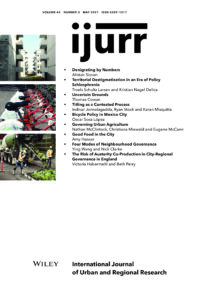This article examines the risk of what we term ‘austerity co‐production’, a weak form of collaborative governance shaped by resource scarcity and fragmented, multiple forms of expertise. Despite the hope that co‐production has radical potential to solve governance challenges across city‐regions, not enough attention has been paid to the institutional contexts in which co‐production is developed. We argue this institutional context is crucial in shaping how co‐production comes to ground and the conditions it reproduces. We draw on a critical case study of metropolitan policymaking in Greater Manchester, England, to examine the gap between imagined and actual institutional contexts for co‐production. We develop a framework that can be applied in different policy areas to assess the potential implementation of co‐production in city‐regional governance. Whilst the promise of co‐production remains, we conclude that austerity co‐production risks operating as an already‐existing default solution to urban problems that constrains more innovative approaches to the governance and politics of the city‐region.
Details
Written by:
Victoria Habermehl & Beth Perry
Digital Object Identifier (DOI)
10.1111/1468-2427.13010
About DOI

